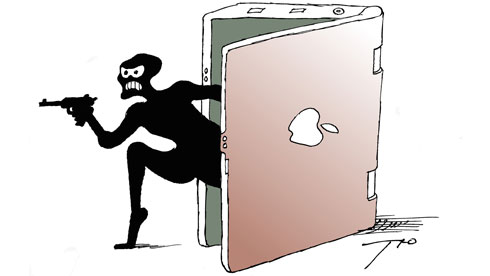On Monday, the country's largest news servers went down. A day later, the largest portal, Seznam.cz, was put out of action for several minutes. On Wednesday bank websites crashed, and on Thursday, mobile telephone operators’ websites also followed. Since then things have been calm. But worries linger. Information about what actually happened is still very sketchy.
The media involved lost some advertising revenue, while the banks had a number of transactions held up – those, to date, are the most visible damages left behind by the cyber storm. The damage, which no one can really quantify at this point, mainly affect the credibility of the Internet in the Czech Republic.
The Czechs have already experienced a similar Internet storm on a smaller scale. Previous attacks were directed at a copyright holders’ association, the OSA, and at parliamentary and government websites. And the attacks always went by the same copybook: a Denial of Service, or DoS attack, in which the attacker overwhelms the server with a huge variety of demands on its resources and the network crashes. “In the past there was always some motivation, for example governments’ passing of controversial Internet regulations and the like.”
Keep calm and carry on
Although at first glance it sounds dramatic, experts are calling for calm: the backbones of state websites – the central control boards of energy companies, the police and various ministries – are run on separate computer systems that are cut off from the classic Internet.
The recent activities are nowhere near as dangerous as the problems that global banks and firms like Visa or MasterCard deal with in the form of mass theft of client data. And if we look at the attack geographically, the impact till now has likewise been nowhere near as serious as what hit Estonia six years ago.
Here, the websites that went down were largely hosted by state institutions. The attack lasted for more than three weeks, and in the end the local politicians ordered Estonia’s Internet sites to be temporarily cut off from the outside world.
Events in the Czech Republic, however, have had quite specific consequences. On March 12, the first-ever emergency meeting of the Council for Cybernetic Security was held, bringing together representatives from several ministries, the police and the Czech National Bank. In view of the unexpected development of the attempted intrusions, the politicians report they will speed up the adoption of a law on cyber security, which should be tabled by the end of June and which will set out in detail how the government is to respond in similar situations.
No clear political motivation
There are, however, more options – for example, participating in NATO’s international research centre, which was created after the events in Tallinn, Estonia. Those events in Tallinn are now interpreted by security experts as a political reprisal by Russian secret services for the removal of the statue of a Soviet soldier from the centre of the city (although the investigation was officially closed without any conclusive result). In the Czech Republic, there is still no clue as to who the offender could have been.
Experts agree that last week's attacks on the Czech Internet are related, as they all took place in the same period and in a similar way. Experience from around the world suggests that what we are dealing with here are most often attacks by “hacktivists”, who are ideologically or politically motivated. However, in this case, there seems to be no clear political motivation for the incidents.
“Hackers work globally, just like the Internet,” says Karel Obluk, co-founder of AVG, one of the Czech Republic’s most successful security software companies. Like many experts he believes that as the Czech Republic is a small country with a relatively developed Internet infrastructure, it appears an ideal testing ground for an attack on a bigger target.
At the most general level, however, the attacks remind us that with the Internet, you have to accept a certain degree of uncertainty, which is likely to grow as the importance of the Internet continues to increase. Last week's cyber storm, despite lasting no more than a few hours, may soon be seen simply as an inevitable part of the game.
View from Romania
Crisis attracts hackers
Notwithstanding the February inauguration of its national Cyber Security Strategy, Romania is still under attack from hackers.
“The cyberwar has also affected Romania, which, at the beginning of March, was the target of an attack that was part of coordinated campaign to spy on several Eastern European countries,” reports QMagazine.
“The attack was much more powerful than the autumn 2012 Red October attack, which targeted data on national policy and natural resources.”
Florian Coldea, of the Romanian Secret Service wonders, “Are we prepared for this cybernetic war?” He continues —
We are negotiating a global economic crisis, which has generated powerful social contradictions. Both of these are motives for the launch of attacks on public computer systems, and attempts to recruit specialist computer programmers. Like other Eastern European countries, Romania, which, is home to large numbers of hackers, excels in this sector. The targets, for the most part, are NATO member countries.
Was this article useful? If so we are delighted!
It is freely available because we believe that the right to free and independent information is essential for democracy. But this right is not guaranteed forever, and independence comes at a cost. We need your support in order to continue publishing independent, multilingual news for all Europeans.
Discover our subscription offers and their exclusive benefits and become a member of our community now!












